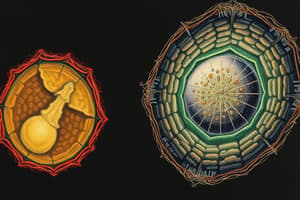Podcast
Questions and Answers
What is the main focus of bioenergetics as mentioned in the text?
What is the main focus of bioenergetics as mentioned in the text?
- How cells communicate with each other
- How cells are structured
- How cells reproduce
- How cells harness energy for daily activities (correct)
What are the fundamental cellular processes responsible for the energy flow in the living world, as per the text?
What are the fundamental cellular processes responsible for the energy flow in the living world, as per the text?
- Photosynthesis and cellular respiration (correct)
- Protein synthesis and DNA replication
- Mitosis and meiosis
- Cell differentiation and specialization
What do prokaryotic and eukaryotic cells differ in, as illustrated in Figure 10.1?
What do prokaryotic and eukaryotic cells differ in, as illustrated in Figure 10.1?
- Number of cell organelles
- Energy harnessing mechanisms (correct)
- Ability to reproduce
- Cellular size
What are the two processes which are fundamental for the energy flow in the living world?
What are the two processes which are fundamental for the energy flow in the living world?
What is the focus of Figure 10.1 in the module?
What is the focus of Figure 10.1 in the module?
What is the Venn diagram in Figure 10.1 used for?
What is the Venn diagram in Figure 10.1 used for?
What is the primary function of photosynthesis?
What is the primary function of photosynthesis?
Where does photosynthesis occur in eukaryotic cells?
Where does photosynthesis occur in eukaryotic cells?
What are the coin-shaped structures inside the chloroplast called?
What are the coin-shaped structures inside the chloroplast called?
What is the chemical equation for photosynthesis?
What is the chemical equation for photosynthesis?
What is produced during the light reactions of photosynthesis?
What is produced during the light reactions of photosynthesis?
What happens when light excites the chlorophyll molecules present in the photosystem?
What happens when light excites the chlorophyll molecules present in the photosystem?
Where do the electrons released by the chlorophyll molecules travel to?
Where do the electrons released by the chlorophyll molecules travel to?
What replaces the lost electrons in the photosystem?
What replaces the lost electrons in the photosystem?
What creates a concentration gradient in the thylakoid space during photosynthesis?
What creates a concentration gradient in the thylakoid space during photosynthesis?
What is the main product of the Calvin Cycle in photosynthesis?
What is the main product of the Calvin Cycle in photosynthesis?
Flashcards are hidden until you start studying
Study Notes
Bioenergetics Overview
- Bioenergetics focuses on the study of energy transfer and transformation within biological systems.
- It examines how organisms utilize energy for metabolic processes.
Fundamental Cellular Processes
- Energy flow in living organisms is driven by two essential processes: photosynthesis and cellular respiration.
- These processes facilitate the conversion of energy from one form to another, sustaining life.
Prokaryotic vs Eukaryotic Cells
- Prokaryotic cells lack a nucleus and membrane-bound organelles, while eukaryotic cells possess these structures.
- Eukaryotic cells include complex organelles such as mitochondria and chloroplasts, crucial for energy production.
Focus of Figure 10.1
- Figure 10.1 illustrates the differences and similarities between prokaryotic and eukaryotic cells.
- It highlights key organelles involved in energy processes, enhancing understanding of cellular structure.
Venn Diagram Purpose
- The Venn diagram in Figure 10.1 is used to compare and contrast the features of prokaryotic and eukaryotic cells.
- It visually represents overlapping characteristics and unique traits of both cell types.
Primary Function of Photosynthesis
- Photosynthesis converts light energy into chemical energy stored in glucose.
- This process is critical for sustaining plant life and providing energy for other organisms.
Location of Photosynthesis in Eukaryotic Cells
- Photosynthesis occurs in the chloroplasts of eukaryotic cells.
- Chloroplasts house the machinery necessary for capturing light energy.
Coin-Shaped Structures in Chloroplasts
- The coin-shaped structures inside chloroplasts are called thylakoids.
- Thylakoids contain chlorophyll, the pigment responsible for capturing light energy.
Chemical Equation for Photosynthesis
-
The overall chemical equation for photosynthesis is:
(6CO_2 + 6H_2O + light \ energy \rightarrow C_6H_{12}O_6 + 6O_2)
Light Reactions of Photosynthesis
- During the light reactions, ATP and NADPH are produced.
- These energy carriers are vital for powering the Calvin Cycle.
Excitation of Chlorophyll Molecules
- When light excites chlorophyll molecules in the photosystem, electrons are energized and released.
- This initiates the electron transport chain, crucial for energy production.
Electron Travel in Photosynthesis
- The excited electrons released by chlorophyll molecules travel through the electron transport chain.
- This pathway facilitates ATP and NADPH production.
Replacement of Lost Electrons
- Water molecules replace the lost electrons in the photosystem by splitting, releasing oxygen gas.
- This process is called photolysis and is essential for maintaining electron flow.
Concentration Gradient in Thylakoid Space
- A concentration gradient of hydrogen ions (H⁺) is created in the thylakoid space during light reactions.
- This gradient drives ATP synthesis through ATP synthase.
Main Product of the Calvin Cycle
- The main product of the Calvin Cycle in photosynthesis is glucose.
- This sugar serves as a vital source of energy and carbon for the plant and other organisms.
Studying That Suits You
Use AI to generate personalized quizzes and flashcards to suit your learning preferences.




